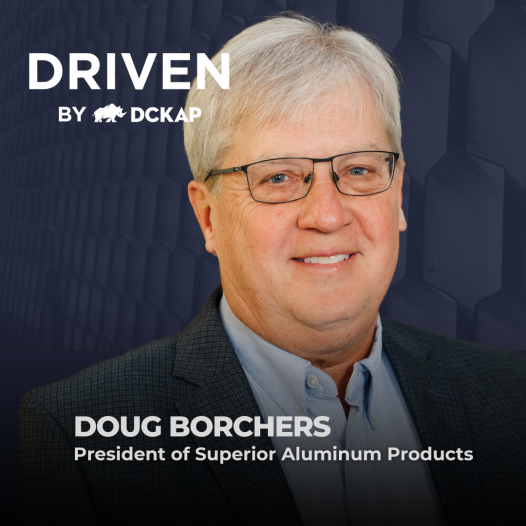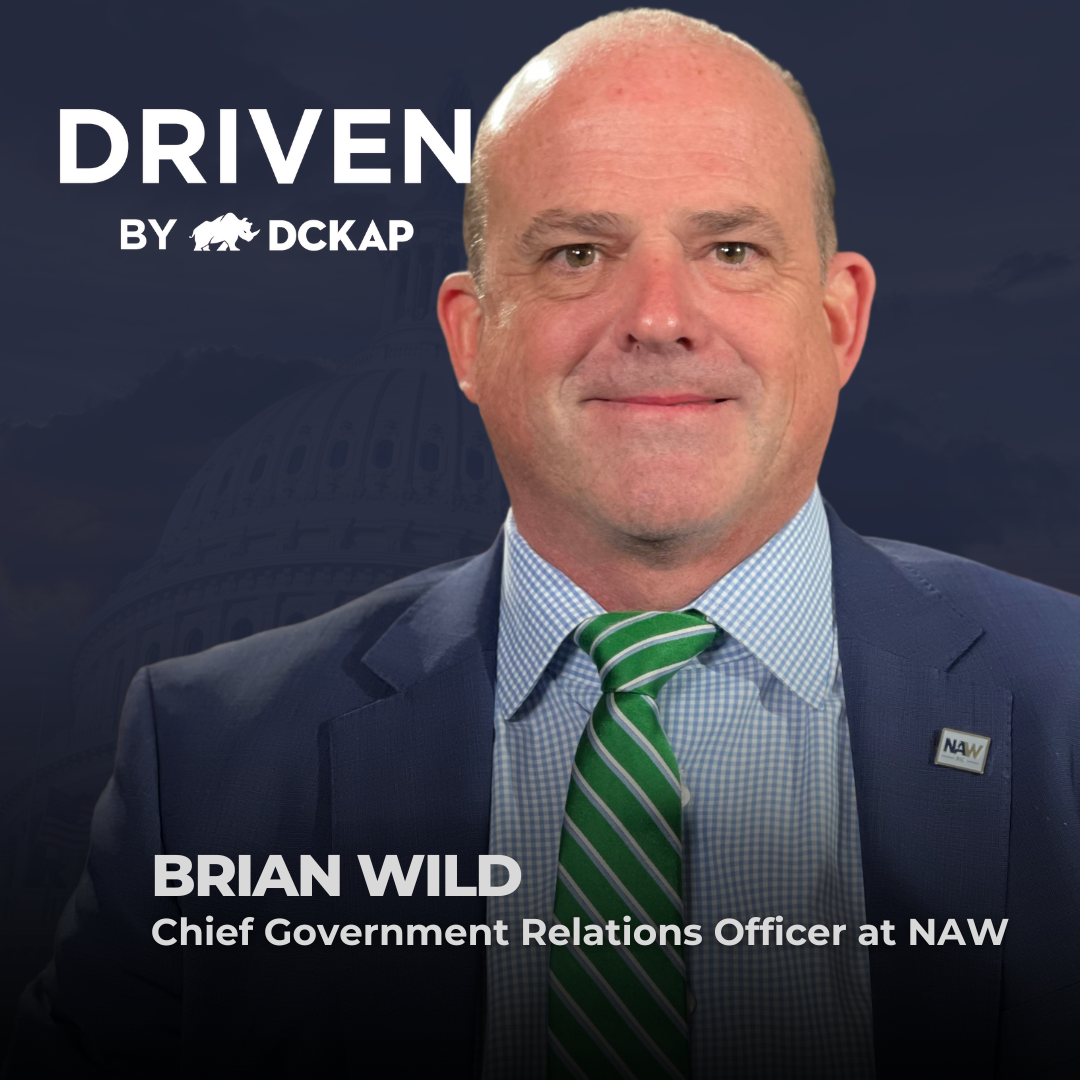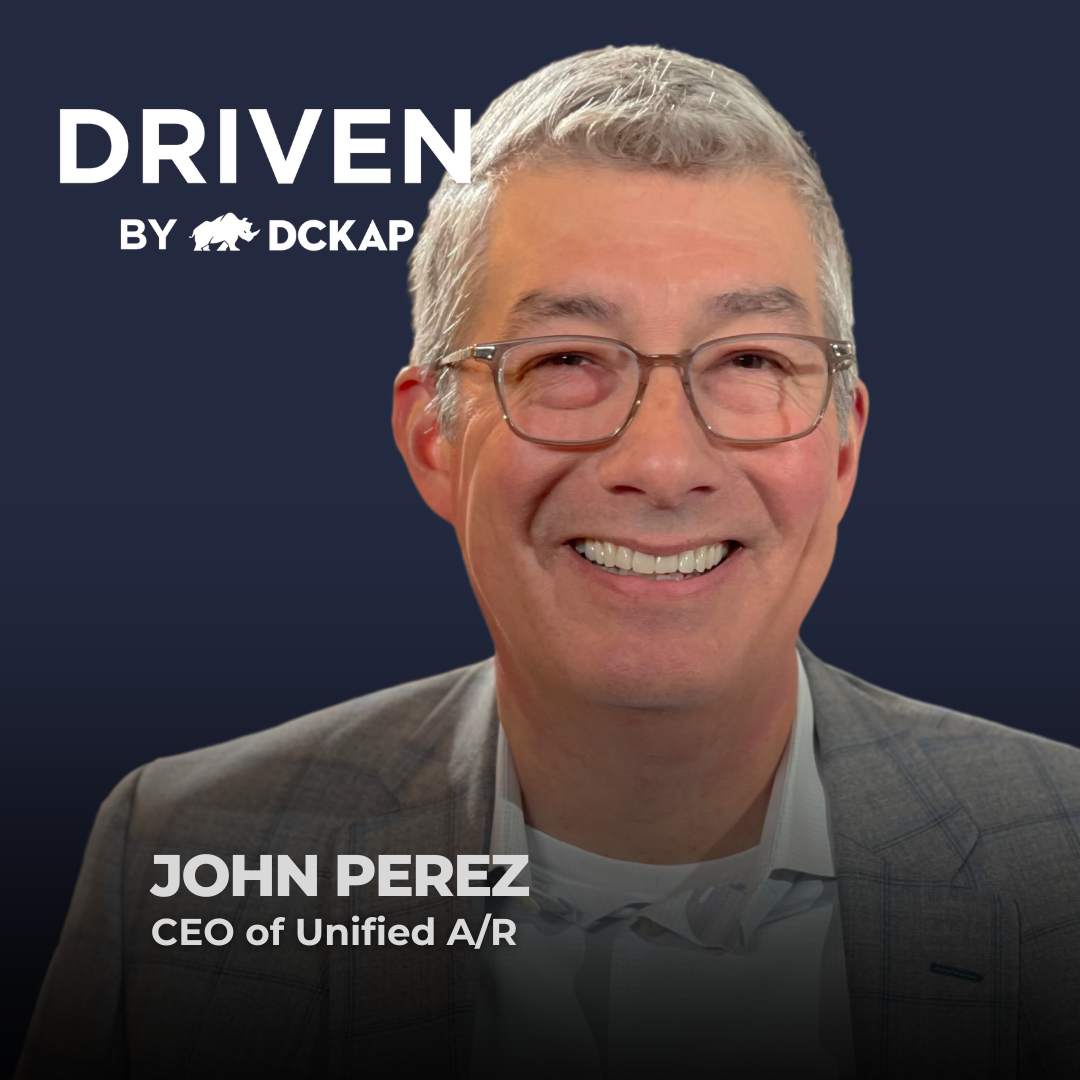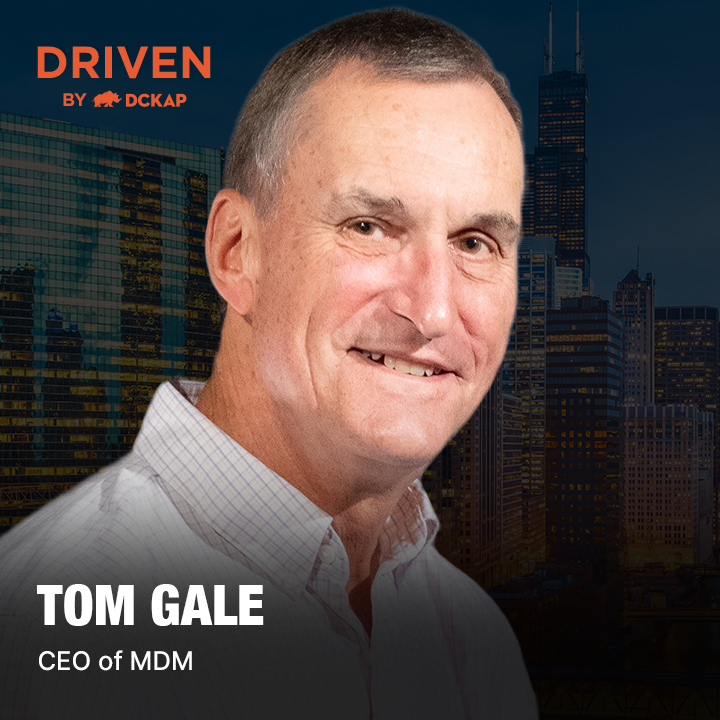In their conversation, we learn from the mindset of personal development, with valuable lessons about creating lasting impact in the community, and how social responsibility drives meaningful business outcomes.
OR LISTEN ON:
Karthik Chidambaram: We are here in Russia, Ohio. I hope I'm pronouncing
that correctly. I thought it was Russia, but then Doug told me it's
(R-oosh-ia), Ohio.
And we are joined by the CEO of Superior Aluminum Products. Doug Borchers.
Doug, thank you so much for joining the Driven podcast, and great to be in
your little town. Thank you for joining the conversation.
Doug Borchers: Thanks for coming to visit us.
Karthik Chidambaram: Can you tell us about Superior Aluminum Products? What
do you guys do?
Doug Borchers: In the big picture, we make architectural aluminum products
for the construction industry. So anything mostly exterior, anything on an
exterior of any type of building that is made out of aluminum, we're
probably involved in making something like that.
So it may be things like aluminum railing, aluminum sport columns, aluminum
vests. We're getting into all kind of other aluminum exterior products.
Karthik Chidambaram: And you manufactured them completely here in the US and
98% of the products associated use-?
Doug Borchers: Yeah, so most of our sourcing comes from the US. We're the
final fabricator, assembly of the end product. We buy our raw materials from
various extrusion mills from around the country. One of the things I didn't
mention earlier is that my father's partner owns a sister company across the
street from us. They make all of our aluminum casting, so they buy bars of
aluminum, melt them down in a kettle.
Pour that liquid aluminum and they pour it into molds and they make all of
our parts for us. So all of our brackets, bases, anything so on is actually
made by our sister company across the street who actually owns half of our
business also.
Karthik Chidambaram: And your products are used at multi-family homes,
government agencies, and many of the places and contractors are mostly of
your customers and you also send-
Doug Borchers: Yeah. So I would say the volume of our business goes through.
Distribution to their individual markets there. On some of the major
projects that are multifamily type projects, we may work directly with the
general contractor.
Karthik Chidambaram: So, Doug, I mean, yours is a very, very inspiring
story. I wanna hear a little bit about your background. So you grew up in
this little town?
Doug Borchers: Yeah, I grew up here and when I turned 18, I told my father
that I'm going to college and I'll never be back to this little town. After
I graduated with my electrical engineering degree, I went to work for Eaton
Corporation and started in Milwaukee and worked for them in various cities.
Eaton Corporation is a fantastic company. Gave me a lot of opportunity for
training. Actually put me in a junior leadership program that I went to
corporate headquarters once a quarter and had some advanced training and so
on. Eaton really treated me well. Family came along and we now have seven
children, but by the time we had three or four children, when you're in a
major corporation, they like to move you every couple of years and.
My wife decided she don't wanna move anymore. She wanted to put roots down
and raise a family. So I went to work for one of Eaton's distributors. They
were called Dickman Supply. And so I got to still continue to work with
Eaton products through, as their distribution arm in the territory.
Karthik Chidambaram: So Eaton is where you got your manufacturing excuse to
you.
So, so that's, that was the playing role for you,
Doug Borchers: correct? That's correct. So Eaton, but they're, they're major
player in. Power distribution and automation business. And so I got
background there. I also got some sales experience there. Worked in some
field offices and worked in conjunction with the factories on, on some
projects.
Karthik Chidambaram: So from even, you moved on to Dickman, Dickman Supply,
right? Electrical distributor. That's correct. So then when we started, I
think the revenue was like around 4 million or something. And you took it to
60 million. Yeah. But you were not business. Well, I
Doug Borchers: didn't take a 6 million. We took it to,
Karthik Chidambaram: oh. So I think that's awesome.
Right. So, but that, you know, obviously leadership is very, very important.
Right? So when you were in the company, right, so you guys grew from 4
million to 60 million, right? So that's where all the distribution
experience happened.
Doug Borchers: Yeah. What was really cool about that, not only did I get
distribution experience, but our customers were most of the major.
Not just electrical contractors, but the manufacturing plants in a, in a
12th county region that we service. And so I got the chance to be inside of
many of these manufacturing facilities and get ideas and borrow good
practices from them. Bring those back to our own company. Got some
experience also belonging to a national association.
It's called NAD, national Association. Life Distributors got an opportunity
to sit on some boards there, sit on the boards through our marketing group,
and borrow ideas from the best around the country, bring those back to small
town Ohio and implements best practices.
Karthik Chidambaram: Yeah. I just wanna ask a little bit on the board
experience, because I think this is the question a lot of people have.
So when you saw, when you were in the board of NAED, but when you saw on
boards, right, I mean that gives you a lot of exposure and opportunity. Is
that why you saw on boards and you're also able to contribute and give back?
Can you talk about that experience a little bit?
Doug Borchers: In the end, yes. I guess I didn't realize that starting out I
was asked to serve the industry for the betterment of the industry, and I
said I'm happy to contribute.
But what I found out, for every one piece I contributed, I was bringing back
five or six ideas to my own company. So the true benefit was what ideas I
brought because I was sitting in a room around a big table like this with
the best and the brightness from around the country. They were doing
creative things in eight states away, I was able to bring that those ideas
back to our company and our team would implement this.
Karthik Chidambaram: You know what I mean? I'd like to say you think like an
owner and act like an owner and execute like an owner, right? So it's also a
very, very important constant of a concept. But that's exactly what you did.
When you go to these conferences and all that, you know, they tell you they
were thinking you were the owner of the company. You were necessarily not
the owner that kind of made you.
There was a little bit of pride in that as well, right?
Doug Borchers: Yeah. And I didn't realize they were thinking that until I
left the company after 19 years. They said, how can you leave the company?
You own it. I said, I don't leave that company. I don't own any of the
companies. They're like, what? We always thought you owned the company.
So that was kind of a cool comment that I would get from peers because that
meant I was portraying, you know, that I was taking ownership of, of our
actions.
Karthik Chidambaram: Superior aluminum products is a business which your
family and Tom's family started, and then you decided to come back. Tell us
what happened.
Doug Borchers: This business was started by my father and his partner, Tom
Francis, in the 1960s. I was a little shaver back then. It grew from less
than a million dollars to about a $10 million business over a. 40. So year
period of time, the business was still successful, but it wasn't growing
like it used to. He asked me to come back to maybe adjust some new ideas
into the business because the shareholders knew and understood there's
something out there for us.
We gotta figure out how to do that. And they said, you're making money for
this other guy and you're grow. Help him grow his business. Bring some of
those ideas to us. And let's see what we can do with our business. So I told
him no a couple of times 'cause I really enjoyed what I was doing and the
owner treated me very well and I was happy and I was, I was gonna finish my
career there and my father kind of tugged at my heart a little bit and said,
we need you.
And so finally I decided to do it, which I swore I wouldn't do when I was 18
and I left this town, I swore I'd never come back. And there it was.
Karthik Chidambaram: Very interesting and wonder your leadership. I mean, I
met your team as well and you know, amazing team and thanks for also giving
us a tour of the entire facility.
I think it was a great to watch how you guys operate, but it was from 2016
to today, you know, almost grown three times. Right? So tell us through that
transition year, right? Because I think this is something I relate to as
well, right? So sometimes the business gets done for whatever reason. I
mean, all of us wanna scale, right?
All of us wanna grow our businesses, but then sometimes you get stagnant and
you need maybe a fresh set of perspective to kind of take from where you are
to kind of get into that growth mode. That's exactly what you did. Maybe I
would even call it a turnaround, right? So they bring you in and they were
able to turn this around.
So what are some of the only things you did to drive this change?
Doug Borchers: Well, I would say probably two major things. One was there
was a lot of talent in this building. There was a lot of talent when I
started, but maybe we weren't getting all the thoughts and ideas out of the
team. So we had to create a culture of, you know, we need everybody's ideas
if we're gonna grow.
So that was one piece of it. The second piece of it was. We have to go
understand not just what have our customers always bought from us, but what
would they buy from us if we were to do certain things? What is my
customer's pain? What happens on your job sites? And that my involvement
could make that better.
And if you open the floor up to them, they'll tell you all they're paying.
Now your job is after you collect all this from customers and perspective
customers come back and put a strategy in place to help the customer solve
this pain. And sometimes that's not about the actual product. Sometimes you
need new products that you didn't know you needed.
And so a lot of that was, it starts with good ideas from your people,
getting good ideas from your customers. When you marry those things
together, you take off.
Karthik Chidambaram: yeah. Listening to your customers, right? You go visit
customer sites. Another thing I thought was very, very cool is, you know
when you started pretty much the first two weeks you started the shop floor
Doug Borchers: and some of that was culture related and some of that was.
My engineering mind wanted to know how stuff goes together. So I think I
shared with you earlier, I, I'm, I'm not very mechanically inclined. I was,
I was probably the worst assembler on the floor those two weeks I was out
there. That's okay. But I got a chance to work beside everybody. I got a
chance to know who they were, who their families were.
What makes them tick. And I also got a chance to put together all the
products we had and as important as anything to see some potential
improvement areas in our system. How do things flow? How does paperwork
flow? What kind of things potentially could we do better? So I wanted to see
that front hand, not just assume anything sitting in a, in an office.
Karthik Chidambaram: Where do we go from here? Right? So, I mean, you have
built a great business. And then what is it next, right? So what's the
vision for the future?
Doug Borchers: A couple of things. Fact, we just had an all company meeting
yesterday to rule this out for our strategic plan for this year. It comes in
a couple areas.
One is we are expanding territories without getting too much detail. We call
it a ripple theory. Throw rock in a pond, focus on the strongest ripple, and
then start going out territory. So we are doing some of the things we're
doing good for. Customers that are within a two hour range. We're doing the
same for customers that are each states away now, so expansion of
territories.
As we're doing that, we're finding other products that are ancillary
products to what we're already building and they say, Hey, can you do this?
We can't find a good source for the owns over our doors. You're already
building all these other external aluminum based products. Can you build us
aluminum auditing for these doorways, because then I can put one purchase
order into you and you can take care of the things I need.
We have three new products scheduled for this year that we're going to
design and start selling. It comes along with building relationships with
customers and them asking, what more can you do with me? We like the
interaction of doing business with you. Can you do some of these other
things?
Karthik Chidambaram: Tell us about the, I thought that was pretty cool.
Doug Borchers: Oh yeah. T day, well, we talked about that. We walk around
out the shop every Tuesday and Thursday, first thing in the morning. Each
group there, there are four different departments out in our, in our
manufacturing floor. Each group gets together with their foreman and they
have a list of things they go over.
What's going well? What kind of things can we improve? What new initiatives
are going on in the company, and they meet anywhere from five minutes to 15
minutes every Tuesday and Thursday. Today at Thet Day huddles, senior
leadership went out and picked a different huddle and sat down with them to
discuss yesterday's strategic plan rollout and how does that affect them,
and what questions did they have and what ideas they have based on what was
discussed.
So that's a 360 degree feedback method that we love to use.
Karthik Chidambaram: The theme of this. How are you driven?
Doug Borchers: I'm driven by seeing people succeed. I'll get emotional about
it, but these people, our team, fantastic people, we talked earlier, a lot
of 'em are farmers, but just very good people that I want that see them
succeed with their family, and if we can succeed as a company and they can
benefit as a result and take it to their family, that's my driving force.
Karthik Chidambaram: You talk about your people, just for our audience, you
know, your people are also farmers. Like you said, they start work at the
same in the morning, finish up at two, go back to the farm, do some work
there, and then finish off the data.
Doug Borchers: Yep.
Karthik Chidambaram: But I would like to end with this question and there's
a lot of change happening around us.
What are you reading right now, or how do you keep yourself updated with all
that that's happening on?
Doug Borchers: So a couple areas. First of all, I'm a big reader, so when my
family goes to bed, my wife and kids go to bed 8 30, 9 o'clock. I'm reading
from nine till. 11 o'clock when I go to bed and I'm trying to, we have the
fortune of having an organization around us here called, and it is a, a
training center, a think tank, training center of business executives that
go there to round table discussions with each other about business
challenges.
So these people aren't gonna have anything to do with the aluminum
fabrication business like we do. It doesn't matter. They have business
challenges that I've probably faced myself. They have market insights as to
what's going on out there. So I'm kind of a sponge of what's going on and
how might that apply to us.
So, and I think I'll be that till the day I die. These people will tell you
I'm sending out articles, I'm sending out snippets from articles and so on.
Can this apply to us? To my HR guy and my controller, to my sales manager
and so on. There has to be a better way, and my job is find it.
Karthik Chidambaram: And you also serve on board of other companies as well?
Doug Borchers: Yeah. I sit on a board of three other companies. In fact, I'm
leaving for Cleveland tomorrow for one of the companies I sit on a board of.
And I always tell the owners when I sit on their board of directors
meetings, I say, and they give me a check for serving on their board. I say,
I really should give you this check because I learned three times what I
gave here because of all the, the, the, the smart minds that are in the
space.
So again, I bring those ideas back to our company also.
Karthik Chidambaram: It's been great chatting with you. I want to thank you
for your time and I really enjoyed this conversation. I enjoyed my visit you
to your little town. Thanks a lot.
Doug Borchers: Thanks for coming.
Sign up to receive email updates
Enter your name and email address below and I'll send you periodic updates about the podcast.




